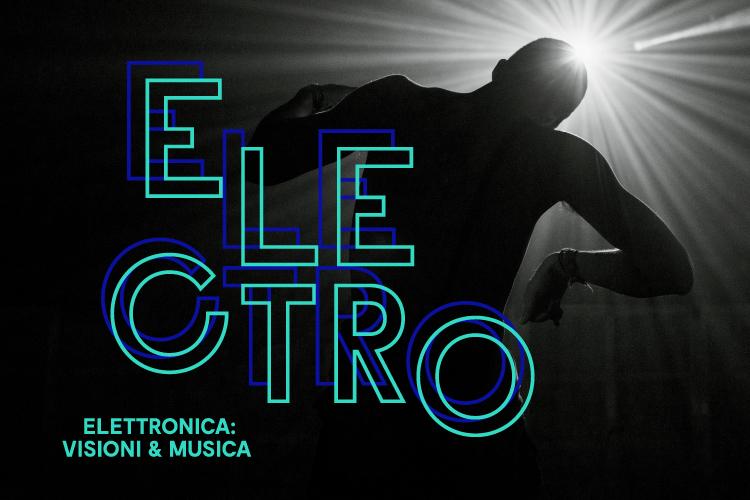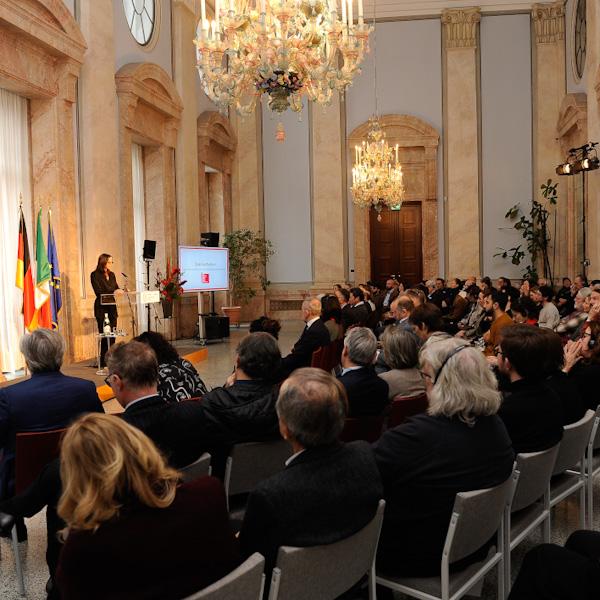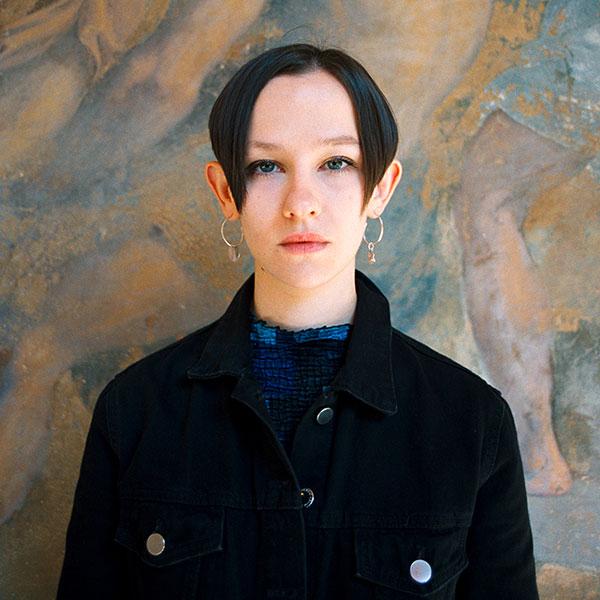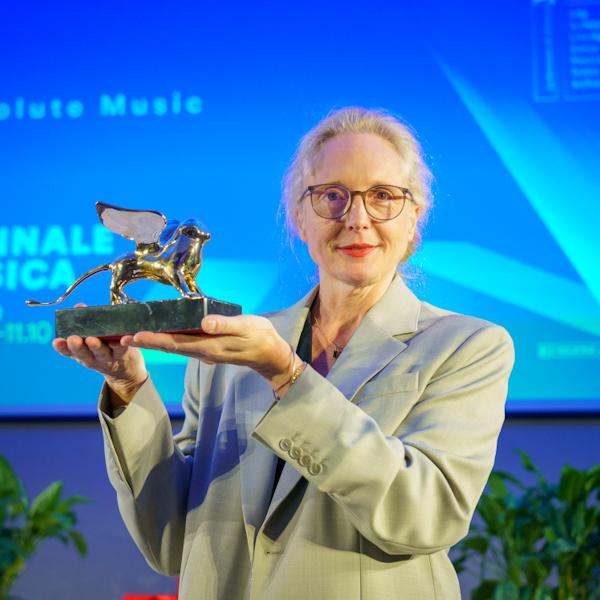
Electro – Electronics: visions & music. An exhibition at the Biennale CIMM
The exhibition is open until 10 November in the spaces of the Biennale CIMM (Teatro del Parco Albanese, Bissuola), Mestre.
Electro
Starting Monday September 23rd through Sunday November 10th 2019, the exhibition Electro – Electronics: visions & music will be open in Mestre in the spaces of the Biennale CIMM (Teatro del Parco Albanese, Bissuola) from 10 am to 7 pm, with free admission.
It will feature 600 square meters of exhibition and a calendar of events with DJ Sets, conversations, presentations and readings open to the public and scheduled on weekends for the entire duration of the exhibition.
Organized by La Biennale di Venezia chaired by Paolo Baratta, in collaboration with the Philharmonie de Paris, Electro talks about electronic music and brings it center stage with the sounds and images it generates, to raise questions about its future.
“Electro is a contribution to the life of the Centro civico della Bissuola – stated Paolo Baratta – and appears as an appropriate form of decentralization for the activities of La Biennale, which the city and its representatives have aspired to, with an action of the highest quality that will offer new opportunities for the lives of the citizens and the city, by integrating the Educational and College activities conceived for the CIMM, the Center for Computer Music and Multimedia inaugurated this year by La Biennale in its two venues of the Arsenale and Bissuola”.
In the conception of curator Jean-Yves Leloup, Electro is an experiential exhibition involving creative professionals from various disciplines – Jean-Michel Jarre, Laurent Garnier, Soundwalk Collective, Moritz Simon Geist, Bruno Peinado, 1024 architecture and Jacob Khrist, among others – asking them for an active contribution to describe the imagery, the locations, the myths, the innovations, the relations with the other arts in electronic dance music. This is the “music of machines”, which since the first rave parties in England, the new beat music in Belgium along with the underground clubs of Detroit and Chicago, over the course of thirty years would assert itself as an artistic trend to become mainstream in the digital era, demonstrating an unrivaled vitality that has influenced graphic design, cinema, video, comic art, dance, plastic arts.
Electro is an exhibition to experience, immersed in a soundtrack by Laurent Garnier – eleven audio tracks that range from 1970s New York dance music to the futuristic techno of the new millennium – in a space “visually decked out” by 1024 architecture.
On exhibit: iconic instruments and experimental devices, musical and visual installations, some of them interactive, contemporary works of art, photo projections (slideshows).
Jean-Michel Jarre, author of the sagas Oxygene and Equinoxe, houses his personal collection of rare synthesizers in an “imaginary studio”, paying tribute to the revolutionary technologies that accompanied him throughout his career – from the laser harp to the one-of-a-kind specimen of the Geiss Matrisequencer 250. While the performer, musician and robotics engineer Moritz Simon Geist exhibits an example from his collection of sound robots MR-808 Interactive, which replicates the sound of the famous drum machine that inspired it, the Roland TR-808, considered the “Fender Stratocaster of Dance”, which (along with the TR-909) would be the basis for all later electro, house and techno music.
Stephan Crasneanscki and Simone Merli from the Soundwalk Collective – which has worked with Patti Smith (Kill Road, The Peyote Dance), jazz musician Mulatu Astatke, American photographer Nan Goldin, Jean-Luc Godard (What We Leave Behind, a radio work with original fragments from the tape archives of the Swiss director), German choreographer Sasha Waltz (Kreatur, Exodos) are responsible for the multi-channel sound installation Oscillation, a synesthetic experience about the most famous techno club in Berlin, the Berghain.
The two sound artists and musicians who live between New York and Berlin consider “the territory as a sort of silent witness of what happened there”; the basic material of their works is always linked to specific places and requires long periods of investigative traveling and work on the field. This was true for the project on the Berghain, which they mapped several times over with 147 sensors. “The sense of space, the fluctuation and levitation remind us of what has remained, the impact that music has left on our bodies. The send of surprise and confusion we feel when we leave a club after listening and dancing for hours, when there is no more solid matter, where everything is molecular and the particles are suspended in mid-air, when silence becomes a voice”.
An architectural conception of space, computational programming and electronic music merge in the works of Pier Schneider and François Wunschel, the heads of 1024 architecture, a name under which they have collaborated with musicians such as Étienne de Créy (alias Superdiscount), Vitalic, Matteo Franceschini and artists such as Daniel Buren.
The dynamic sculptures and immersive installations of Pier Schneider and François Wunschel orchestrate score of sounds and light in the space that interact controlled by a computer code, like in the two projects presented in the exhibition. Walking Cube - designed, developed and built with the American artist Jason Cook - is a cube that activates gradually, creates its own rhythm and begins to dance. Core is an installation that transforms music into volumes of dynamic light, embodying, in a vibrant oscillating spatial form, the different chapters in the soundtrack composed by Laurent Garnier. A visual and sensorial journey that implements a new technology to spatialize music with dynamic volumetric light. The installation design refers to the digital and scenographic creations that accompany most of the electronic musicians in the concert.
They say of French artist Bruno Peinado that he composes his works like a DJ, between mix, remix and samplings of smileys, strobospheres for discos, surf and skateboards, Tetris or Rubik cubes, Peinado presents two works: Sans titre (The Endless Summer) and Sans titre (Vanity Flightcase) both inspired by the explosion of acid house music and the rave parties in England in the late 1980s.
Dance floor panorama 1987-2017 is a tour around the world in the most famous clubs on the planet yesterday and today, that recreates the atmospheres, people, spaces, fashions and trends. An eyewitness account in images, rigorously shown from the inside by photographers and artists that are members in the tribes of clubbers and ravers who crowded the dance floor.
From Manchester and the Fac 51 Hacienda and Boardwalk revealed by Peter J. Walsh in the Queen’s Paris seen through the lens of Agnès Dahan to the scene at Goa, Arambol and Anjuna as witnessed by Luc Pliot and the rave rituals in Montréal through the eyes of Caroline Hayeur; from the group of the Club Kids in New York by Alexis Dibiasio to the LoveParade Family in Berlin portrayed by Alfred Steffen from Plastic Dreams – as they were called by Olivier Degorce – from the club and rave scenes in Paris to the series of techonomades of Wilfrid Estève. From more recent years come the series of photographs by Anna Adamo about the underground gabber culture in Florida and at the NumberOne in Italy, the Boom Festival in Portugal seen by Raphaèl Pincas, to the Electric Daisy Carnival Las Vegas by Roger Kisby, the new rave scene in Moscow of the Skotoboinya and the W17chø by Sasha Mademuaselle, just to name a few.
A special focus on the places, clubs, festivals, occupied buildings and abandoned locations that made Paris the new capital of the electronic scene is the subject of the Divination series, by photographer Jacob Khrist, a first-hand account directed by an animator – at the same level as the DJs, organizers and dancers – of this scene.
A prologue to the 63rd International Festival of Contemporary Music of La Biennale (Venice, 27 September > 6 October) directed by Ivan Fedele, Electro presents some of the moments in the exhibition presented through August of this year at the Cité de la Musique in Paris.
Radio Stereocittà, Radio Cafè, Radio Pocket and V Pocket are the media partners for the exhibition Electro – Electronics: visions & music.
Meetings and DJ Sets
During the Electro exhibition (23 September > 10 November), there will be a series of meetings about the dance floor culture, its history and development; a series of DJ Sets will also be organized on weekends, to be conducted by DJs and electronic musicians with the help of tutors and the young participants in the DJ workshop held by the CIMM, the Center for Computer Music and Multimedia of La Biennale di Venezia.
Sunday, September 29th, 4 pm > 6 pm
BRUNO BELISSIMO
DJ Set and Live Bass
An Italian-Canadian DJ, producer and poly-instrumentalist, Bruno Belissimo, following his experience with the Low Frequency Club, worked with many different artists both in the studio and live (Calcutta, Michelin, Colapesce). He is the founder of FUTURO, a studio that works in the production of soundtracks, installations and sound design. Ethiopia/Galaxy is the first single released in June 2014 by Locale Internazionale, followed a few months later by From Canada/To Paradise and by Infradisco in 2015, the latter accompanied by a short sci-fi film made in Toronto. In April 2016, he released his first full-length entitled simply Bruno Belissimo. During that time, an intense live-performance schedule took him throughout Italy and abroad for a long series of concerts in India, Chile, USA, Canada, Sweden, Spain and the Czech Republic. In 2018, the year he released his second album Ghetto Falsetto, he also participated in the prestigious ESNS EUROSONIC Festival in Groningen (NL), SXSW in Austin, Tx (USA) and THE GREAT ESCAPE in Brighton (UK).
Bruno Belissimo’s shows – in which his performance includes playing the bass and controlling machines and synthesizers in real time – are energetic and pulsating, highlighting the full range of his talent.
Saturday October 12th, 6 pm > 9 pm
FABIO DE LUCA
From Motion comes the Notion: the Oral History of Dance Music
a conversation with Fabio De Luca, Guglielmo Bottin, Sergio Messina
followed by
DJ Set with Fabio De Luca
Dance, the music created for the express purpose of dancing, has been intimately tied to pop culture since the beginning of its history, at the dawn of the twentieth century. From jazz to rock and roll, from disco to techno, dance has been a constant thread, following the history of the past century and recording its social and cultural transformations. Together with Fabio De Luca we will review the main phases in this story to try and understand why Dance music was so important and why it continues to be central to contemporary pop culture.
A journalist and DJ, Fabio De Luca is one of the most acute observers in Italy of the electronic scene. He has written extensively on the subject: for Rolling Stone Italia (of which he was the assistant editor), Repubblica XL, Il Sole 24 Ore; he has published books - Discoinferno: Storia del ballo in Italia 1946-2006; and hosted programmes for Radio Rai - Suoni & Ultrasuoni, Planet Rock, Weekendance; he has created music streaming formats (TIMmusic) and interviewed Daft Punk when he was twenty years old. He currently deals with formats and content for voice assistants with an Italian start-up called SOLO, and has a weekly podcast of “profoundly wrong music” titled The Tuesday Tapes.
Saturday October 19th, 6 pm > 9 pm
LELE SACCHI
Evolution of the figure of the DJ: culture, dance floor and revolution
a conversation with Lele Sacchi, Guglielmo Bottin, Sergio Messina
followed by
DJ Set with Lele Sacchi
An overview of the birth and development of the profession of music selector and a snapshot of today’s international scene. With Lele Sacchi we will try to understand how the profession has changed, both from a technological point of view and in the role of the DJ, and how Internet can be an effective tool to disseminate and publicize one’s work.
Lele Sacchi, a DJ since 1995, is one of the leading figures on the scene of electronic, house and alternative music in Italy. He has almost completed a full tour around the world in the clubs he has played in and has recorded music for important international labels. For many years he was the artistic director of the Magazzini Generali in Milan and now at the Apollo in Milan and the Muretto in Jesolo. One of the founders of the Elita festival, host of the programme Inthemix on Rai Radio 2, Sacchi was a judge for the reality show Top DJ broadcast by Sky, His first book Club Confidential (UTET) was published in 2018.
Sunday October 27th, 6 pm > 9 pm
LEO MAS
Italian Balearic: musical eclecticism and innovative clubbing from Ibiza to Jesolo
a conversation with Leo Mas, Guglielmo Bottin, Sergio Messina
followed by
DJ Set with Leo Mas
In parallel with the more visible Dance music, other musical scenes have developed over the past thirty years that are quite divergent with respect to the codified sounds and rhythms of house and techno. Among them, the case of the Balearic Beat is particularly interesting. This is not a specific genre, but rather a more eclectic approach to DJing that seeks a more heterogeneous selection, for sounds and soundscapes that are not exclusively for disco clubs. Today Balearic has become a category that encompasses rather unconventional music, in which fans from all around the planet can recognize themselves. Together with Leo Mas we will attempt to explore this wide and varied world and to understand its mechanisms.
An authentic legend of the Italian club scene, Leo Mas is simply one of the most talented DJs around. An inventor of the Balearic sound, he was in Ibiza when the bubble burst in the 1980s, at a time when he was a protagonist at the Amnesia with Alfredo Fiorito (an Argentine DJ who fled the 1976 coup, and a recognized pioneer of the Ibiza sound) which turned him into one of the most important collectors of record albums for connaisseurs. A nonconformist, an icon of style and musical research, Leo Mas has become one of the most beloved Italian artists on all the dance floors in Europe, an experience that allowed him to bring back to Italy an invaluable baggage of experiences during those years: Movida, Area City, Macrillo, Ranch, Mazoom, Go! Bang, Alter Ego, Musikò, Aida, Country Club, Principe, Syncopate, Ex-o-groove and Fluid are just some of the clubs that, starting in the late 1980s, showcased his musical vision completely devoid of established patterns and that, thanks specifically to his personality, became a beacon for thousands of young fans.
Thursday October 31st, 6 pm > 9 pm
DJ WORKSHOP PARTY
collective DJ Set with the participants of the Biennale College CIMM
This is the final result of the workshop for DJs under the age of 26 of the Biennale College CIMM (Center for Computer Music and Multimedia) in Mestre. The guys and girls who completed the two sessions of the basic DJ workshop (supervised by the tutors Bottin, Spiller and Mammarella) are now invited to perform in a collective DJ Set in the lounge space of the exhibition Electro – Electronics: visions & music.
CIMM – Center for Computer Music and Multimedia
The CIMM – Center for Computer Music and Multimedia of La Biennale di Venezia is the new infrastructure founded to promote the diverse cultures of electronic music, and designated for permanent research and experimentation, practice and workshops.
Developed by La Biennale under the supervision of Ivan Fedele, Director of the Music Department, the CIMM is divided into two venues:
• one venue in Venice, with two studios in the Sale d’Armi at the Arsenale, dedicated to artistic research and ongoing projects at the service of the exhibitions, festivals and initiatives of La Biennale di Venezia;
• the second venue in Mestre, in the Teatro del Parco Albanese, Bissuola (currently being restored by the City of Venice) with a rehearsal studio and a recording studio for musicians and young people from the area.
The CIMM in Venice
- is currently developing the electronic parts for the concert by Emanuela Battigelli and the 4 short chamber operas of the Biennale College Musica, events of the 63rd International Festival of Contemporary Music presented respectively on October 3rd at the Teatro alle Tese and October 6th at the Teatro Piccolo Arsenale.
- will host, from November 11th to 16th, a cycle of 6 masterclasses, both theoretical and practical, focusing on the new frontiers and languages of electronic music, with researchers, composers and artists from some of the most cutting-edge computer music and multimedia studios in the world. The new international call selected up to 20 composers under the age of 31.
The institutions and specialists invited to participate include Yann Orlarey from GRAME in Lyon; Laura Bianchini and Michelangelo Lupone from the CRM in Rome; Frédéric Bevilacqua and Michelle Agnes Magalhaes from IRCAM in Paris; Alvise Vidolin from SaMPL in Padua; artist Andrew Quinn.
At the end of the sessions, Director Ivan Fedele will reserve the right to select up to three participants in the masterclasses to commission a work to be performed during the 2020 Biennale Musica. Finally, a concert will be held at the conclusion of the cycle of masterclasses, on November 17th at the Teatro Piccolo Arsenale.
The CIMM in Mestre
- in April 2019, two national calls were launched: the first for a basic course in DJing (11 young people were selected), the second for an advanced course for producers of electronic music (12 applicants were selected).
Both workshops, currently underway, are being led by Bottin (Guglielmo Bottin, 1977) – the internationally renowned producer, DJ and sound designer – and a team of professionals in the field including Bob Benozzo (producer and sound engineer nominated for a Grammy award), Sergio Messina (researcher and professor of sound design), Spiller and Fabrizio Mammarella (established DJs and producers).
- in the spaces of Teatro del Parco Albanese, between June and July, parallel to the courses at CIMM, an educational programme was held, featuring three theatre and dance workshops, and three hands-on artistic workshops involving 118 children from schools and summer camp programmes: Centro Infanzia Il Germoglio in Mestre, Scuola dell’Infanzia paritaria Madonna della Pace in Mestre, Cooperativa Sociale "SQUERO" Centro estivo Le Magie del Sapere in Mestre.


